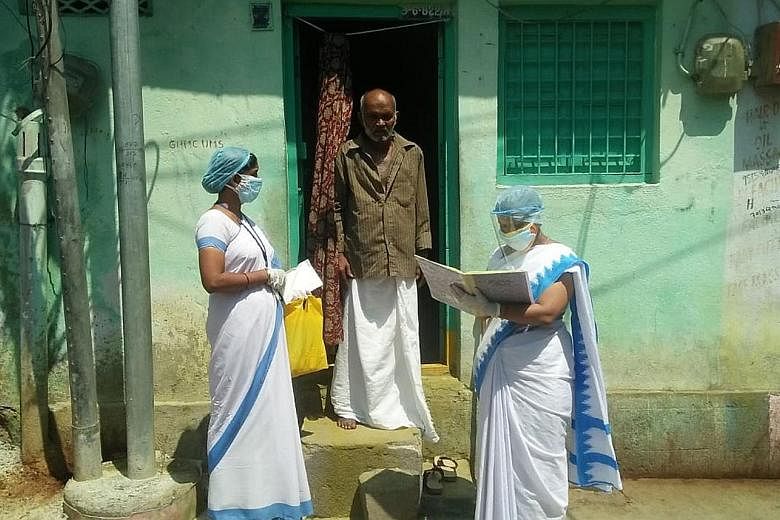One million women community health workers form the tip of the spear in India's battle against the coronavirus.
But many of them work without proper protection or payment while facing discrimination and violence.
ASHAs, or accredited social health activists, were first introduced into India's public healthcare system in 2005, in one of the world's largest community health worker programmes.
The word "Asha" means hope in many Indian languages. ASHAs are usually young women with basic education, often drawn from poor Dalit or Adivasi families in the community.
ASHAs connect their communities with the public health system.
While technically volunteers, they perform crucial tasks, including recording data on births, deaths, marriages and child immunisations; providing information on nutrition, sanitation, maternal and child health; accompanying pregnant women and sick children to healthcare centres; and helping treat diarrhoea, fever and tuberculosis.
The Covid-19 outbreak added to their duties. ASHAs are now expected to educate people on precautions to take against infection, monitor quarantined households, trace contacts of infected people and help with testing. They have no holidays.
"We have to do surveillance of 25 households a day now and we were recently told to check the oxygen levels of every family member. It takes at least 10 hours a day, longer in villages where the houses are spaced apart," said Ms Anandi, a health worker in Satara district of Maharashtra, India's worst affected state.
Despite their bewildering range of responsibilities, most Indian states do not pay them a fixed wage, pension, insurance or employment benefits. They are entitled to 2,000 rupees (S$37) as honorarium. There are additional incentives for immunisation and prenatal care. For example, they get US$1 (S$1.40) for each full immunisation.
ASHA unions say all payments have been delayed or reduced without explanation.
In April, the central government said ASHA workers would receive an additional 1,000 rupees for coronavirus-related duties between January and June and a life insurance cover of 500,000 rupees in case they contract Covid-19.
But most state governments have not yet complied with the directive, according to a survey of ASHA workers and union leaders in 16 states conducted by news site Article 14 and Behanbox, a gender-focused digital platform.
ASHA workers have become a key plank in India's effort to test and trace Covid-19 infections, but most have received only a few online training sessions. They said they trained themselves by watching online videos and television.
Many were forced to work without basic protective gear for weeks, before the central government asked states to give personal protective equipment to ASHA workers.
ASHAs are still classified as "low-risk" and can receive only gloves and a triple-layer mask. But even these have been hard to get.
"The government wants us to be corona warriors but sends us to battle without basic armour. They gave us a disposable mask in March - the one you can't wear for longer than eight hours. So we stitched 100,000 masks ourselves," said Ms Lakshmi Singh, an ASHA supervisor in Bhind, in the central state of Madhya Pradesh.
"Gloves are only for people working in containment zones. We know how many asymptomatic people there are, it's risky. But what can we do if the government doesn't care about us? We just wear dupattas (scarves) around our faces and go to work for the community," said Ms Anandi.
Several ASHA workers said they had to buy their own soap and sanitiser. Without buses or private transport, they walk long hours to do surveys in the punishing Indian summer heat, with a homemade rehydrating solution of water, lemon, salt and sugar in their bags.
An ASHA worker in Madhya Pradesh said she slept in a buffalo shed next to her one-room house to avoid potentially infecting her own family.
Since ASHAs are expected to enforce quarantines, they are often at the receiving end of verbal abuse and even physical attacks. Some have also reported they were stigmatised by neighbours and relatives because of fears that they may contract Covid-19 through their work and spread the disease.
"Over time, most people have understood that ASHA workers are their only point of contact to beat the virus, so it's better. I just wish the government would pay us minimum wage and treat us with care and dignity so we don't feel like bonded labourers any longer," said Ms Singh.











